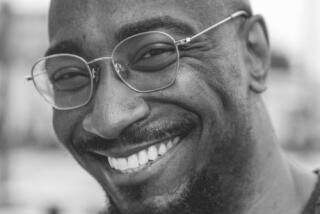Tales of Southern Comfort and Tension
The soul of Chris Offutt’s literary world rests in the hollows of Kentucky, where the hills themselves are capable of both nurturing life and smothering it.
The landscape, in fact, is as much a presence in Offutt’s fiction as his characters. In his new collection of short stories, “Out of the Woods,” Offutt examines the conflicting relationships and codes that tie his characters to home.
For some, the bonds form sustaining roots. For others, they are snares of barbed wire.
These are tense stories, understated yet heavy with personal revelations. A truck driver in “High Water Everywhere” decides to get off the road and return home, looking for roots after years of rootlessness, swapping one heavy and stabilizing load for another. In “Moscow, Idaho,” an ex-con trying to stay straight finds that freedom can be as confining as prison.
In “Target Practice,” a Kentuckian named Ray, who took what’s known regionally as the Hillbilly Highway to find work in Detroit’s auto plants, returns home to a cold reception by his father. Their relationship is defined by hard traditions and unquestioned rules of behavior. Emotion is a weakness. Fathers sire sons rather than raise them. A man who can’t keep his wife home isn’t a man.
When Ray, whose wife ran off after one Detroit winter, calls his father to offer to show him his new rifle, he is rebuffed by a noncommittal “I don’t know.”
“Ray looked through the window at tufts of grass struggling in the clay dirt. It was his dirt and his grass and his house. The dream of all Kentuckians in Detroit was to come home for good. Now that he was back, he realized that people here wanted to be left alone. There was more community at the Chrysler plant than on his home hill.”
The father eventually wanders over, and Ray, in a flash of fear, shoots him. Shades of Chekhov, where if a gun pops up early you know it will be used later. In Offutt’s hands, though, the gun is an instrument of strength. And self-discovery, as Ray realizes, while driving his father for medical help, that for the first time he doesn’t fear him. And in fear’s absence grows love.
Violence or its threat frames Offutt’s characters’ lives. In a sense, it’s a return to form for Offutt, 40, who is among the best short-story writers of his generation. He made his first splash with the critically acclaimed collection “Kentucky Straight” (Vintage, 1992) and followed it a few months later with the memoir “The Same River Twice” (Simon & Schuster, 1993). But his only novel, “The Good Brother” (Simon & Schuster, 1997), received lukewarm reviews and was saddled by a plot line that loomed larger than his characters.
Here, though, the characters are back in rightful proportion, dominating the stories but still at the mercy of the Kentucky hills, both physically and emotionally.
More to Read
Sign up for our Book Club newsletter
Get the latest news, events and more from the Los Angeles Times Book Club, and help us get L.A. reading and talking.
You may occasionally receive promotional content from the Los Angeles Times.









